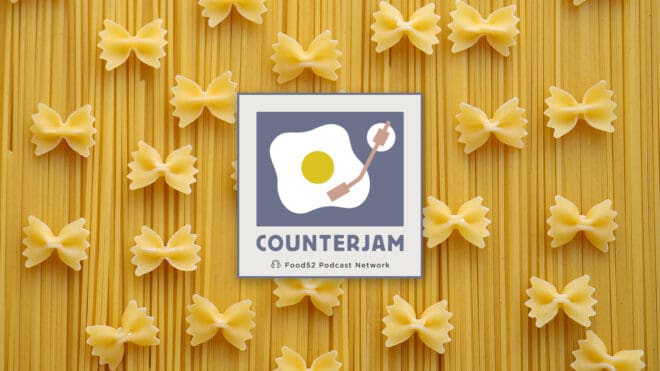An Interview with Counterjam’s Peter J. Kim

Wondering how to make ramen carbonara? Looking for a theoretical breakdown of the perfect bodega egg and cheese sandwich? Hoping to discover fresh music without having to embark on the emotional rollercoaster that is falling down a late night five-minute-turned-five-hour Bandcamp rabbit hole? Well, you’re in luck because there’s a show that’s delivering on all of these deliciously niche requests and more. Enter Counterjam, a new podcast dedicated to exploring cultural identity through food and music.
It’s created and hosted by Peter J. Kim, the former founding director of the Museum of Food and Drink and current Food Content Lead at Pinterest. Each episode focuses on one cultural identity, discussing its cuisine and featuring music by artists from the community. Peter and producer Coral Lee have rounded up a wide-ranging and impressive lineup of guests, which have included Kelis, Margaret Cho and Jarobi White, to name a few. Counterjam is the latest show to join Food52’s Podcast Network, and it’s breathing new life into a genre that has historically failed to center diverse perspectives and voices. While discussions can take delightfully unexpected turns, what you can prepare for is consistently entertaining, tender and unapologetically frank discussions. Oh, and some damn-good music, too.
I caught up with Peter to talk about the genesis of the show, why food and music are so fundamental to informing cultural identity and the one dish he’d bring to a desert island.
Apple Podcasts | Pocket Casts | Stitcher | Spotify | Website | RSS
ARIELLE VETRO: Could you tell readers a little bit about who you are?
PETER J. KIM: I am a long-standing food nerd. I started cooking from the age of 10 when I could first reach the stove top and I developed a deep interest in food culture, history and science in college. Then I had the good fortune after college of being able to live in a lot of different cultures. Everywhere I went I immersed myself in the food culture of that place; I found it was one of the best ways that I could bridge the gap. And even when language would fail we always had food and drink to connect over.
I think one of the things I realized is that food is culture and it is really fundamental to who we are, how we define ourselves and how we connect with other people. Anyway, all of that’s to say that food is a deep passion of mine. The other thing that I love is music. I’ve been a musician my whole life. I grew up in a classic Korean-American household where I was forced to play violin and piano, but later in life I chose the guitar and then I started singing and later dabbling in music production, hip hop, electronic music.
I started MCing and then producing beats and DJing. I also just have a voracious interest in understanding cultures through music. And I would say music is the other thing that is really definitional of who we are. I had on the one hand this track of working in food, and on the other hand, this interest in music. And at a certain point I was like, “There’s got to be a way to meld this together.” And that was really the genesis of this podcast.
VETRO: Food as you well know is such a powerful prism through which to share personal histories and make sense of one’s self and community. Music is similarly – as you said – so fundamental to defining and reaffirming identity. But there are surprisingly few podcasts out there looking at the intersection of food and music. Why did you decide to zero in on those two areas?
KIM: If I really had to boil down the two things that people go to first if asked to describe their culture, I genuinely think that a lot of people – if not most people – would start with talking about what they eat, and would also talk about the music that they listen to. When you think about the really big, important moments in our lives: when we get married, when we are celebrating becoming an adult, when we are mourning the loss of a loved one, the rituals that we observe to mark those moments always involve food and music. That really transcends any cultural boundaries. So to me, food and music act as really powerful lenses for understanding cultural identity. And ultimately that’s what Counterjam is about. The way in which we do that is by talking to people about their food and then listening to music by people from that community.
As far as why there aren’t so many food and music podcasts – well there just aren’t that many music podcasts. And that’s actually because of the minefield that is licensing music for podcasts. I just decided I will actually go through the work to get the music licenses and the way I make that easier is by focusing on independent artists who fully own their music. It’s only three songs we feature excerpts of in each episode, but a weirdly lot of work has to go into making that possible.
VETRO: You have a really exciting slate of guests on the show. Was there any one interview that stands out?
KIM: Absolutely! We have a forthcoming episode on Nigerian food culture and I always start with, “Who’s the dream guest?” And the dream guest for music is Fela Kuti and his family.
Fela passed a while ago, but Femi Kuti [Fela’s son] is the standard bearer for the Kuti legacy. And for those who don’t know, there’s a music form that originated out of Nigeria called Afrobeats and Fela was the pioneer of that. It’s an amazing music form that weaves together political activism, deep grooves and compelling horn hooks. I sent an email on a lark and I heard back this enthusiastic response because Femi doesn’t get invited to talk about food very much. And he said that he wanted to have his son on – Made Kuti – and they just released a father-son album together. So we did the interview, and they’re just outside Lagos and the internet was not-so-great, and the power went out once, and they had to fire up a back-up generator, and then their back-up generator went out so they had to fire up a second back-up generator. And that happens on the show.
I think Femi and Made got into an argument over whether plantains or yams are better, and then they talk about how they collaborate on music and then have this beautiful moment where Femi’s talking about how Made has surpassed him in skill and how they both inspire each other. So that episode features the two of them and the music of both of them and that was just a dream come true. I feel like I can die happy now.
VETRO: You like to ask your guests what dish they’d bring to a desert island, so what would yours be?
KIM: This can change from day to day, but one that I keep coming back to is a very simple dish. It is a bowl of white rice, it is my mom’s cucumber kimchi – which is so garlicky you will exude garlic afterwards – and it would have hotdog and a sunny side-up egg. I grew up eating a lot of hotdogs with rice as a kid. So it’s a flavor combination that takes me back.
VETRO: Finally, what do you hope listeners will gain from Counterjam?
KIM: I hope that Counterjam is entertaining. I hope they find it a nice outlet to be able to listen to stories, listen to music and not think about whatever might be ailing [them] in other ways. In terms of take-aways, I want to be a finger on the scale of human connection. This podcast is not the silver bullet, but I think we can all work together to try to understand each other a little bit better. And with each episode taking on a different cultural identity and talking to people from those cultures, I hope every listener can put themselves in their shoes and understand that perspective a little bit more than they might have before.
Being a part of that general arc toward connection and empathy. The last thing is representation and making sure that diverse voices are being heard in the podcast. In my cursory survey of food podcasts I actually felt that it wasn’t as inclusive as it should be. I think generally shows are thinking more and more about that, but for this show this is very much the heart and soul of it and so it’s baked into the DNA of Counterjam. We’re going culture by culture so inherently there’s going to be a level of diversity and inclusion to the show that I hope is helpful to making sure that people know that the podcasting world is not just for one particular perspective, but can be inclusive of everybody.
This interview has been edited for length and clarity













Comments
Comments are closed.